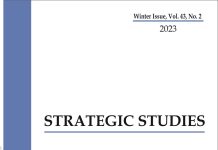Abstract
State systems have undergone some drastic changes for the last few decades largely because of the information revolution and the concept of Westphalia state sovereignty (1648) and state-centric paradigm is withering away. Additionally, globalization has changed the landscape of international politics in which new non-state actors are emerging more powerful where they could easily threaten state sovereignty and security. State is vying for its identity in a globalized world and advanced democracies are getting borderless (European Community) One factor that has remained persistent and perpetual, despite ongoing regionalism and surge towards globalization, is the national interest. As long as the national interest continues to be a supreme priority for states, realist paradigm would remain the dominating theory in international relations. For the accomplishment of national interest, states tend to remain engaged in balancing strategies either by acquiring Weapons of Mass Destructions (WMDs) or conventional military build-ups. Within this context, this paper attempts to see China-Pakistan strategic partnership vis-à-vis Indo-US strategic cooperation. It also aims to explore whether both the interactions are providing a balancing influence in the region. This paper also divulges multiple strategies of ‘Hard Balancing’ between India and Pakistan which seems to maintain stability in the region.













